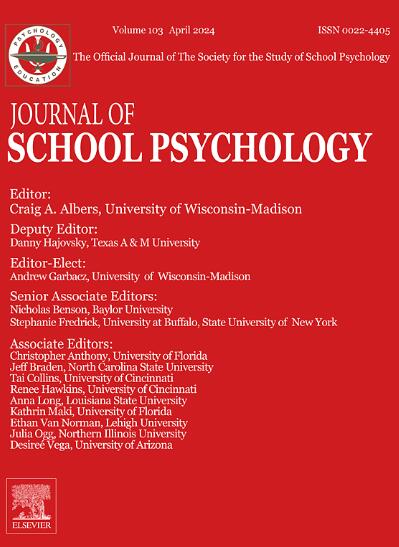Randomized controlled trial of the early adolescent coping power program: Effects on emotional and behavioral problems in middle schoolers
IF 4.1
1区 心理学
Q1 PSYCHOLOGY, SOCIAL
引用次数: 0
Abstract
We report findings from a 40 middle school randomized controlled trial of an adapted version of Coping Power (Lochman & Wells, 2002a) for middle schoolers, called the Early Adolescent Coping Power (EACP) Program (Bradshaw et al., 2019) to determine the impact of EACP on adolescents' mental health outcomes, as indicated by student self-reported and teacher-ratings on the Behavior Assessment System for Children (BASC). The EACP was implemented over the course of students' 7th grade school year. The sample included 709 students who were identified at baseline through a teacher screening process for aggressive behavior and enrolled into the project (69.8 % African American and 59.4 % male). For teacher-reported outcomes, intent to treat (ITT) results indicated that EACP was associated with a decrease in externalizing problems over time. Exploration of effect modification suggested that girls in the EACP condition demonstrated statistically significant decreases in school problems over time, as well as a baseline by intervention effect whereby students and schools with greater baseline difficulties demonstrated decreased internalizing problems over time. For student-reported outcomes, there was a significant moderated effect, whereby girls in EACP demonstrated more favorable self-reported personal adjustment outcomes. Together, these results suggest that the early adolescent adaptation of Coping Power had preventive effects for 7th grade participants, and promotive effects specifically for girls, over time.
青少年早期应对能力项目对中学生情绪和行为问题的影响
我们报告了一项来自40所中学的随机对照试验的结果,该试验采用了适应版的应对能力(Lochman &;Wells, 2002a),称为青少年早期应对能力(EACP)计划(Bradshaw等人,2019),以确定EACP对青少年心理健康结果的影响,如学生在儿童行为评估系统(BASC)上的自我报告和教师评分所示。EACP在学生的七年级学年期间实施。样本包括709名学生,他们在基线时通过教师筛选过程确定是否有攻击行为,并参加了该项目(69.8%是非裔美国人,59.4%是男性)。对于教师报告的结果,意向治疗(ITT)结果表明,随着时间的推移,EACP与外化问题减少有关。对效果修改的探索表明,EACP条件下的女孩在学校问题上随着时间的推移显示出统计学上显著的减少,以及基线干预效果,即基线困难较大的学生和学校随着时间的推移显示出内化问题的减少。对于学生报告的结果,存在显著的调节效应,即EACP中的女孩表现出更有利的自我报告的个人适应结果。总之,这些结果表明,随着时间的推移,青少年早期适应应对能力对七年级的参与者有预防作用,特别是对女孩有促进作用。
本文章由计算机程序翻译,如有差异,请以英文原文为准。
求助全文
约1分钟内获得全文
求助全文
来源期刊

Journal of School Psychology
PSYCHOLOGY, EDUCATIONAL-
CiteScore
6.70
自引率
8.00%
发文量
71
期刊介绍:
The Journal of School Psychology publishes original empirical articles and critical reviews of the literature on research and practices relevant to psychological and behavioral processes in school settings. JSP presents research on intervention mechanisms and approaches; schooling effects on the development of social, cognitive, mental-health, and achievement-related outcomes; assessment; and consultation. Submissions from a variety of disciplines are encouraged. All manuscripts are read by the Editor and one or more editorial consultants with the intent of providing appropriate and constructive written reviews.
 求助内容:
求助内容: 应助结果提醒方式:
应助结果提醒方式:


